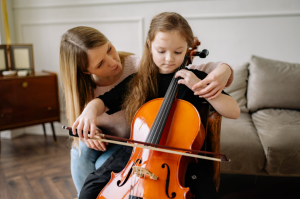
Can Musical Training Improve a Child’s Cognitive Functioning?
For decades, scientists have been interested in the correlation between music and brain function. Several of these correlational studies have shown that children who underwent music training showed improved cognitive functioning in all areas of life and even excelled academically.
Of course, the performance improvement was most evidently observed in areas that are closely linked to playing music such as rhythm perception, auditory discrimination, and motor skills. That said, musical training also showed promising results in other domains such as task-switching, attention to detail, working memory, verbal intelligence, and logical thinking.
This is also called brain plasticity or neuroplasticity caused by musical training which means that the child’s nervous system changes as they learn music. The effect of musical training is most pronounced during early childhood when the child’s brain is still growing and there’s a window of opportunity. That said, musical training at any age is a great way to keep your brain sharp and focused.
In fact, parents should consider enrolling their children in formal music classes where they not only learn to play an instrument but also learn music theory. The key is to get them started at the right age so they have the opportunity to experience enhanced brain function while their nervous system is still open to growth.
If you’re a parent who’s considering musical training for their child, you’re in the right place. In this blog, we’re going to explore the different aspects of cognitive functioning that improve as the child gets formal musical training.
Music and Listening Skills
One of the biggest differences seen in musically trained versus untrained children is the how they listen and process auditory information. This is most obvious because it’s directly linked to musical training and the way it engages the ears. Not only are musically trained children adept at recognizing notes, harmony, and varying pitches, but also at picking up on speech amidst noise.
These skills develop especially well in children between the ages of 8 and 10 as they get at least 6-12 months of consistent musical training along with practice. Studies have shown that doing so improves the child’s overall listening skills while developing speech segmentation. This is a direct result of improved sound discrimination as musically trained children are able to pay attention to the different types of sounds.
Music and Linguistic Skills
Musical and non-musical sounds are processed by the same areas of the auditory system and while speech is different from music, musical training actually transfers to speech and linguistics as well. Studies suggest that this is largely because music automatically stimulates parts of the brain that are responsible for speech function as well.
To that end, these children also become better at syntax processing and distinguishing the different sounds in speech (just like they do in music). They can speak much more fluently understand words better which also helps their ability to read aloud. Their enhanced reading ability is primarily due to the fact that musical training teaches them to pay attention and connect sounds to symbols (which is essentially what reading is all about).
In addition to all this, musical training also has a positive impact on verbal memory as trained children are observed to remember words better than those with no training. Such children are also better adept at learning a second language. In fact, ease of second language acquisition has also been observed in adults who were trained in music as children.
Executive Function
Executive function includes all processes performed by the prefrontal cortex of the brain which allow a person to stay focused on specific means and goals. It also includes the ability to willingly alter behavior in response to certain stimuli in the surroundings. Simply put, executive function includes inhibition, attention, working memory, and task-switching (all of which require conscious effort).
Studies have shown that musical training can improve these processes. This is largely because playing an instrument demands certain level of memory and attention to get the tune right. It also requires the ability to switch between the different tasks and coordinating between all of them to produce music. Since these functions are heavily engaged while playing music, it can also transfer to other non-musical domains.
Additional studies have also shown children who were given musical training for at least 18 months also had enhanced attention and improved memory processes. Their working memory was significantly better than children who had received no musical training. This is largely because musical training requires children to memorize chords to play specific notes and the continuity of playing the chords depends on how well the child remembers.
Academic Excellence and Overall IQ
There have been countless studies on how musical training can improve overall IQ levels. This is essentially applicable to children who are of the age where their brains are still developing while they’re actively engaged in learning music. The increased IQ reflects more in certain domains that are most closely linked to musical learning however, scientists are still aiming to learn how much musical training transfers to distant domains.
When it comes to music lessons, it’s additional schooling that aims to refine the child’s executive functions such as focus, memorization, and attention span while giving them the tools to master a technical skill. All of these things can transfer to other academic domains and translate into improved results in other subjects.
Of course, this also shows a positive correlation to general IQ as well which is measured based on the testing of different types of cognitive performance. These include vocabulary tests and visualization of three-dimensional structures from diagrams of two-dimensional objects. All of these things show improved arithmetic skills as well non-verbal reasoning.
According to a study conducted in 2008, it was observed that children who received musical training also performed better on Raven’s Matrices test which essentially tests non-verbal reasoning. That said, genetic predisposition and environmental factors are also important in determining a child’s IQ level so a unidimensional study can never give us any absolute results.
All of this is fairly compelling evidence of the benefits of enrolling your child in formal musical training. All you need to do is get them started at the right time so they can get the most out of the experience. Ultimately, this experience will also transfer to the other areas of their life and you’ll be able to unlock your child’s maximum potential and intelligence.
The best part is the musical training will give them the discipline to learn new things and your child will never be daunted to take up new challenges.
Want Your Child to Learn Music? The Young Musician Music Institute Can Help
If the evidence between musical training and brain function has compelled you to enroll your child in a music institute, The Young Musician Music Institute is your best option.
We provide diverse music certificate courses to beginners and enthusiasts which include instrument training such as cello, drum, saxophone, and guitar lessons. You can also enroll your child in our music theory or singing classes in Abu Dhabi to unlock their potential and improve their cognitive function.
Need more information to get started? Book your free trial lesson today, or call +971 2 556 2080 or +971 2 678 3550 to get answers to all your queries.




